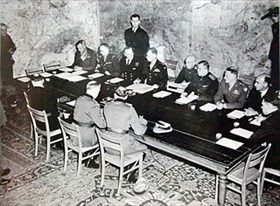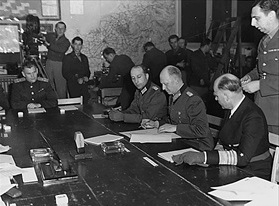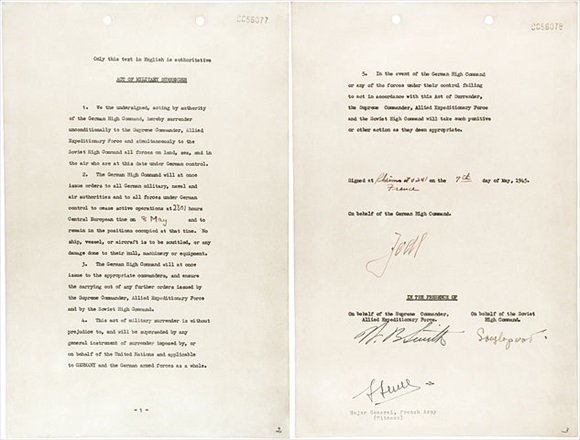GERMANS SIGN UNCONDITIONAL SURRENDER
Reims, France · May 7, 1945
Five days after the suicide of Adolf Hitler on April 30, 1945, Adm. Hans-Georg von Friedeburg, an emissary from Grand Admiral Karl Doenitz, arrived in Reims, France, headquarters of Gen. Dwight D. Eisenhower, Supreme Commander Allied Expeditionary Force. Friedeburg was tasked with opening surrender negotiations on behalf of Doenitz, head of the rump Nazi state centered on Flensburg, Northern Germany.
Friedeburg began, Eisenhower remarked later, “playing for time” so that the German armed forces could move as many men as possible behind Anglo-American lines and away from Soviet lines in Eastern Europe. Friedeburg was brought up short when Eisenhower’s representative, Gen. Walter Bedell Smith, made it plain that the Allies would only accept unconditional surrender on all fronts. Doenitz complied with the demand, empowering Col. Gen. Alfred Jodl, Chief of the Operations Staff of the Armed Forces High Command (Oberkommando der Wehrmacht, or OKW), to sign formal papers of surrender in Reims on this date in 1945. After affixing his signature, 54‑year-old Jodl addressed his audience, saying: “At this hour, we [he meant the German nation and German Armed Forces] can only hope that the victors will be generous.” Eisenhower coolly responded that “the German Supreme Commander will appear for the surrender to the Russians at the time and the place that the Russian High Command will designate.”
Following the signing ceremony Eisenhower informed the Allied War Office in London: “The mission of this Allied Force was fulfilled at 0241, local time, May 7, 1945.” The next day in Berlin, May 8, 1945, Field Marshal Wilhelm Keitel, head of the entire OKW, along with representatives of the German Navy and Air Force, signed a second unconditional surrender document in Berlin-Karlshorst. Present were Soviet Marshal Georgy Zhukov, signing on behalf of the Supreme Command of the Red Army; British Air Chief Marshal Arthur Tedder, signing as Gen. Eisenhower’s representative; and French Gen. Jean de Lattre de Tassigny, who signed as a witness. When Keitel saw the French delegation, he exclaimed, “What? The French too?” The war in Europe was over. The German Reich Adolf Hitler had said would endure a thousand years lasted a pitiful and extremely painful dozen.
[amazon_carousel widget_type=”ASINList” width=”600″ height=”200″ title=”Recommended Reading” market_place=”US” shuffle_products=”False” show_border=”False” asin=”1473845572,0060540370,1612000983,1922178853,0700611878,0802139949,1929631286,0316035998,0143122134,0752445898″ /]
The German Instrument of Surrender, May 7, 1945
 |  |
Left: At 2:41 a.m. on Monday, May 7, 1945, Col. Gen. Alfred Jodl, Chief of the Operations Staff of the Armed Forces High Command, along with two other German officers, gathered in the map room of the headquarters (formerly a school) of Gen. Dwight D. Eisenhower, Supreme Allied Commander in Europe. The three German officers (backs to the camera) were flanked on three sides of the large table by U.S., British, French, and Soviet officers, who watched Jodl sign the German Instrument of Surrender, which ended World War II in Europe exactly 70 years ago.
![]()
Right: Jodl, Chief of Staff in Reich President Adm. Karl Doenitz’s government (successor regime to Hitler’s), signs the document of unconditional surrender. On Jodl’s left is Adm. Hans-Georg von Friedeburg, Commander in Chief of the German Navy, and on the right is Jodl’s aide and translator, Maj. Wilhelm Oxenius. Friedeburg, who was in Berlin the next day to sign the second German Instrument of Surrender at Soviet military headquarters, committed suicide on May 23, 1945, when a British team arrived at Doenitz’s headquarters in Flensburg, Northern Germany, and arrested members of his Nazi government. Jodl was tried by the postwar International Military Tribunal at Nuremberg, sentenced to death, and hanged as a war criminal on October 16, 1946.
 |
Above: Jodl signed the “Act of Military Surrender,” the first of two surrender documents signed by the German military. At the same time Jodl signed Eisenhower’s copy of the surrender document, he signed three more, one each for Great Britain, the Soviet Union, and France. Over Jodl’s signature are the words, “On behalf of the German High Command,” not (and this became significant later) on behalf of Reich President Karl Doenitz and his civilian government. Under Jodl’s signature in capital letters are the words, “IN THE PRESENCE OF.” Then appeared the signatures of Gen. Walter Bedell Smith, Eisenhower’s chief of staff, who signed on behalf of the Supreme Commander, Allied Expeditionary Force; Ivan Sousloparov, who signed on behalf of the Soviet High Command; and François Sevez, a Major General in the French Army, who signed as witness.
Contemporary Newsreel Account of Repeat German Surrender Ceremony the Next Day in Berlin, May 8, 1945, VE Day
![]()

 History buffs, there is good news! The Daily Chronicles of World War II is now available as an ebook for $4.99 on Amazon.com. Containing a year’s worth of dated entries from this website, the ebook brings the story of this tumultuous era to life in a compelling, authoritative, and succinct manner. Featuring inventive navigation aids, the ebook enables readers to instantly move forward or backward by month and date to different dated entries. Simple and elegant! Click
History buffs, there is good news! The Daily Chronicles of World War II is now available as an ebook for $4.99 on Amazon.com. Containing a year’s worth of dated entries from this website, the ebook brings the story of this tumultuous era to life in a compelling, authoritative, and succinct manner. Featuring inventive navigation aids, the ebook enables readers to instantly move forward or backward by month and date to different dated entries. Simple and elegant! Click 











